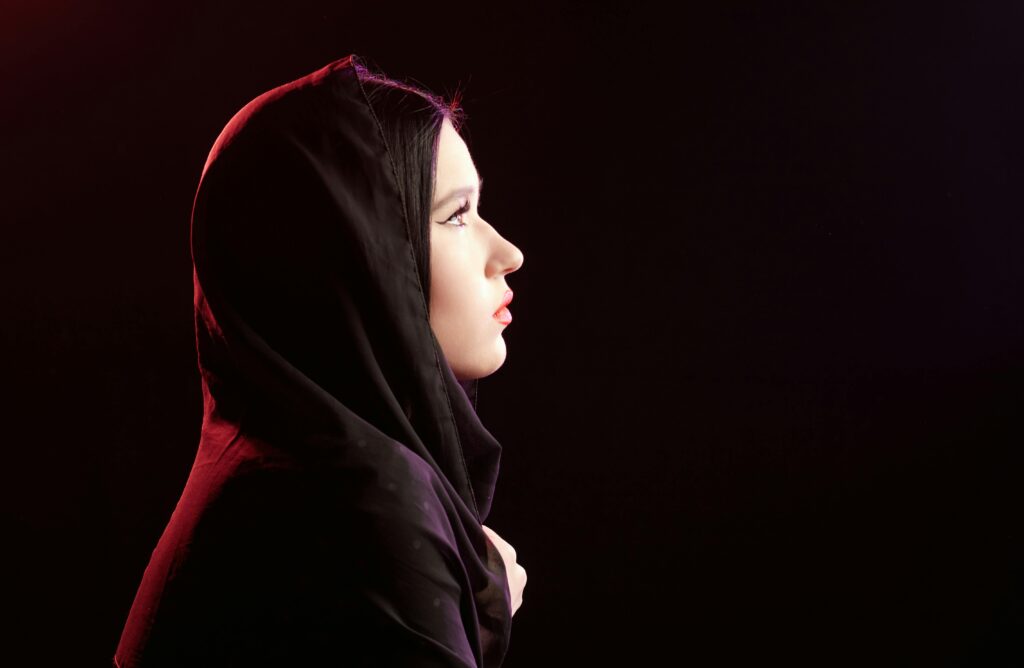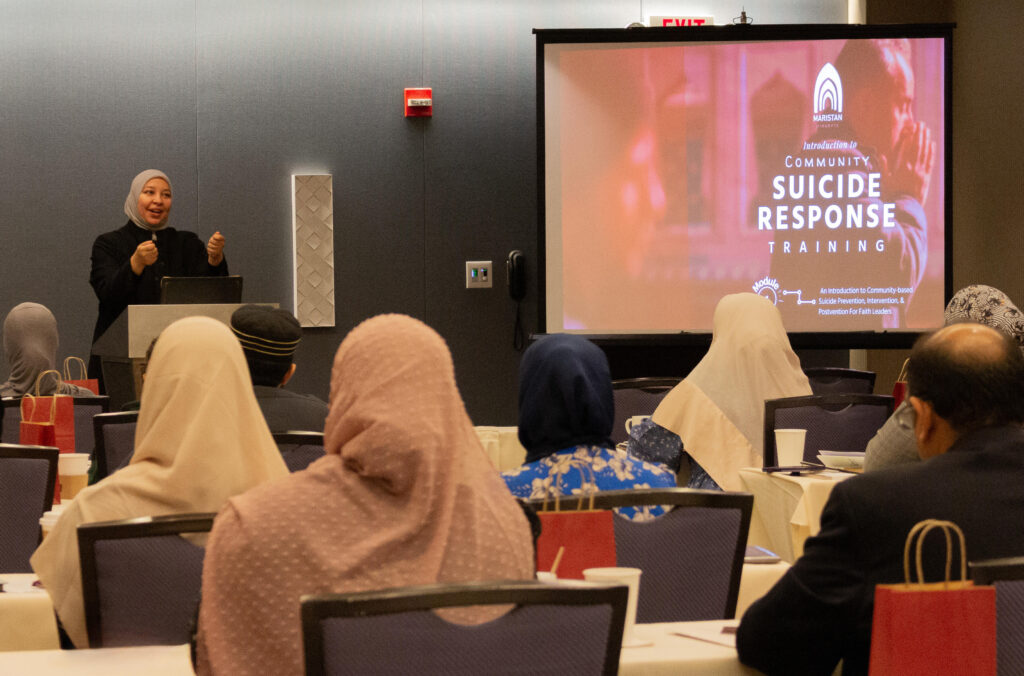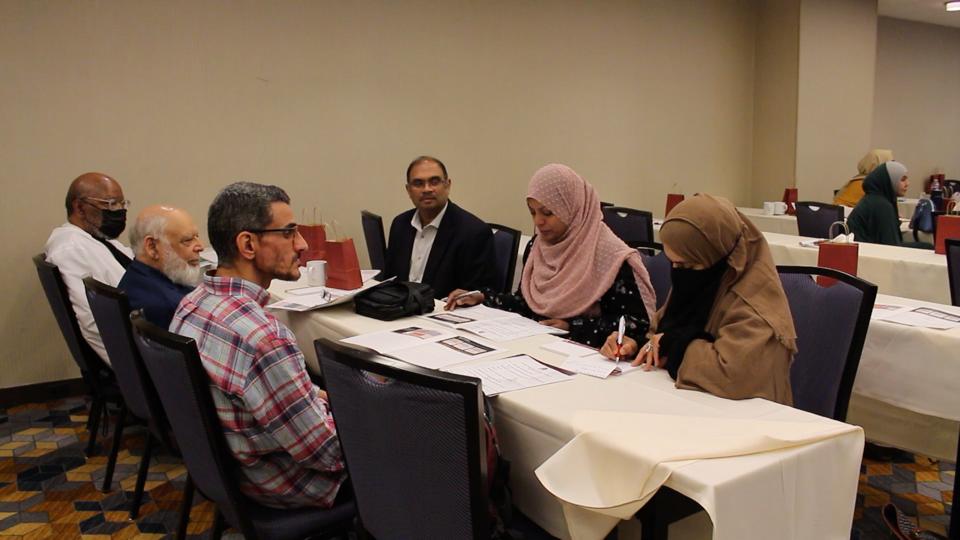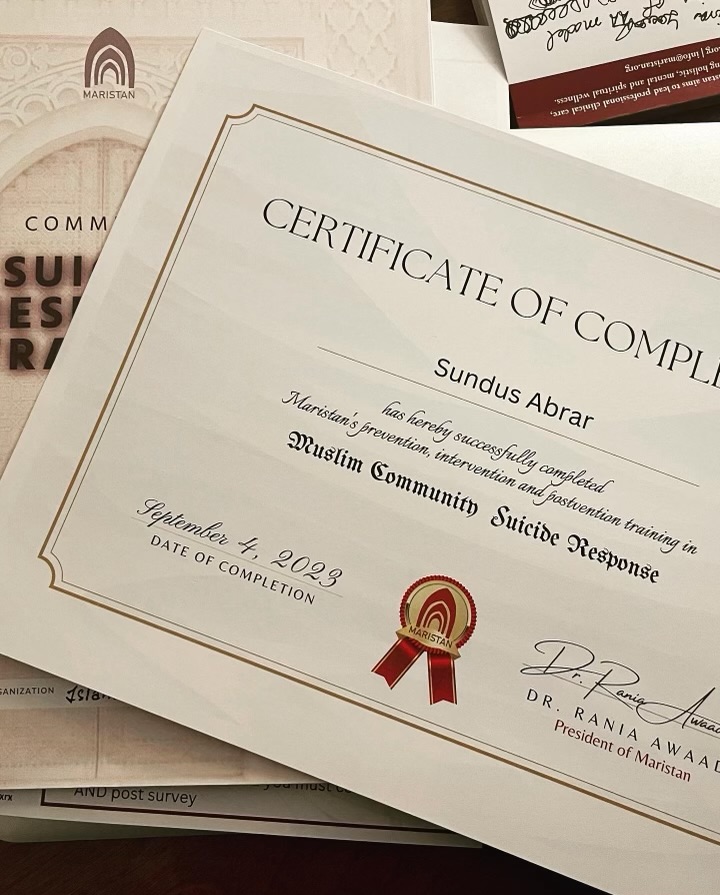The post Emotional Wellbeing and Mental Health Must Be Prioritized in Islamic Education appeared first on Islamic Horizons.
]]>By Anmol Irfan
Mar/Apr 25

There is no question that Islam places great importance in holistic health and emotional wellbeing. However, in the last 1,400 years, some Muslim communities replaced that focus with spiritual bypassing, the idea that we can simply pray or worship enough to fix mental health issues. While a strong spiritual connection and trust in God is helpful to one’s emotional wellbeing, it is not a magic cure-all.
Fatima Khan, a Muslim therapist from Maryland, said spiritual bypassing is a common occurrence with her clients. “I’ve talked to people and seen that they’ve had experiences where they’ve focused on mental health and instead are being told to pray more,” she said.
Islamic scholars and academics are attempting to change this narrative. Institutions like Maristan and the Muslim Mental Health Lab address key issues that are often brushed under the rug, including mental illnesses, abuse, and faith based counseling. These institutes work with North American Muslim communities that face rising levels of Islamophobia, More Muslim youth have been reporting mental and emotional struggles.
At the Milwaukee Muslim Women’s Coalition Mental Health Conference in 2021, Dr. Sameera Ahmed presented data showing that at least 13% of Muslim youth are dealing with anxiety, and almost 30% have digestive disorders, mood disorders, ADHD, trauma, or have experienced sexual abuse.
“For many people who are Muslim, it can be an everyday experience,” she said. “55% of Muslim youth, one in two Muslim high school students, and 78% of Muslim college students have experienced religious discrimination. And that’s direct experience. It doesn’t even include perceived experiences.”
There is a gap in how these studies are understood by everyday Muslims, especially teenagers and children, in the context of faith. At a time when Muslim youth in North America have to face so many different challenges, including exposure to non-Islamic perspectives, it’s crucial that their emotional wellbeing is cared for from a young age.
Islamic education institutions and platforms can play a huge role in making these topics accessible for children and teenagers and help them connect with themselves better. Khan, a former counselor in an Islamic school, said she’s seeing the shift where Islamic educational institutions are creating space for these conversations. But overall, the community does have work to do.
“Sometimes I’ll get clients who are adults who are getting therapy, but their parents don’t know about it or don’t believe in it,” Khan shared.
Studies show that Muslim youth often struggle with identity due to differing information they consume at home, abroad, or online. A sense of not belonging and not feeling connection with their faith is often a reason for emotional distress and disconnect. Mosques, educational programmes, and schools can play a role in building that emotional connection amongst youth.
“Now masjids are doing things on halloween to still do something fun on that day, doing stuff to show kids we can still be fun in religion,” said Canada-based social worker and therapist Faizah Latif.
But education has to go deeper than just events, and it has to happen in all aspects of young Muslim lives. “There’s so many layers to this, and I think that to talk about emotional wellbeing is so important because at the basic, foundational level, we forget that Islam is also about character and mannerisms and how we see people,” said Latif.
She said that Islamic educational institutes can help young Muslims in these aspects by placing equal importance on teaching emotional tools as they do on other religious teachings such as reading the Quran and praying.
Khan pointed out that while more Islamic schools employ counselors now, they can be doing more to increase awareness and education around emotional wellbeing. “Islam is holistic and it covers all these things for us. Something I’ve learned that works in my pursuit of Islamic education is learning the Prophet’s stories and understanding the emotions they were feeling.”
Fairuziana Humam, a community educator and researcher on Islamic psychology, also emphasized that stories and books can be a great way to get young Muslims involved in such conversations.
“Children need to understand that Allah is loving and there for us, and from there, open more conversations, instead of growing up with a fear-based perception of Allah,” Humam said.
Humam also pointed out that language and communication play a big role in helping Muslim youth understand these topics in relation to their everyday lives. It can be as simple as starting with concepts they are already familiar with tauheed or salah.
“[Salah is] an example of the benefits of mindfulness being applied to practices we already have,” Khan said. She stressed the importance of discussing emotional wellbeing as a part of faith rather than a separate topic.
Anmol Irfan is a freelance journalist and the co-founder of Echoes Media, a slow news platform based on the global south. Her work focuses on marginalized narratives within global discourse including topics such as gender justice, mental health, climate, and more.
The post Emotional Wellbeing and Mental Health Must Be Prioritized in Islamic Education appeared first on Islamic Horizons.
]]>The post Gaslighting, Manipulation, and Narcissism in the Muslim Community appeared first on Islamic Horizons.
]]>By Areena Ali Memon
Mar/Apr 2024

“There was no me left — just him and his needs. The viler things he said, the more I tried to prove my love and worth…Verbally and emotionally, he used gaslighting and love bombing. I felt consumed in every aspect of my being. He gave the silent treatment like a star, and I would try to jolt him out of dark moods, taking responsibility for everything and apologizing just to stop the fights.”
This is just one of many survivor stories included in the 2016 book “Becoming the Narcissist’s Nightmare” written by Shahida Arabi, M.A., a published researcher, expert, and Harvard graduate specializing in trauma and psychology.
In his “Vocabulary of a Narcissist” (Sept. 2022) khutba, Shaykh Omar Suleiman said that “The Quran calls upon us to be very introspective. Even in the story of Fir‘aun, instead of thinking about pharaohs of the world as they exist today, actually ask yourself, ‘Do I have some of the traits of Fir‘aun?’”
The term narcissism is being thrown around a lot lately by both experts and survivors. However, just like passing other judgments, we should be cautious before attaching potentially damaging labels.
Healthy and Unhealthy Narcissism
This term originates from Greek mythology, according to which a handsome young man named Narcissus fell in love with his image reflected in a pool of water. He spent hours gazing at the image and admiring himself. It’s a personality trait that, just like anger, we all possess. While most people see it in a negative light, there is also a healthy version of narcissism that looks like better self-esteem.
“Healthy narcissism is the middle path between arrogant narcissism and being a doormat,” said Haleh Banani (MA, University of Houston; founder, The Mindful Hearts Academy) who also offers faith-based counseling. “One extreme is all about themselves with no regard to other people and how they are impacted. The other end of the spectrum is total disregard for themselves, where a people pleaser would do anything for anyone at any time without caring about how it impacts them.”
Healthy narcissism is having self-esteem and assertiveness without stepping on others. That’s the middle path toward which Islam calls us. She also explained how people use the concept of eethaar (sacrifice) to justify being a people pleaser, although they usually act out of frustration because they cannot say “No.”
Unhealthy narcissism, however, can turn into a full-blown personality disorder. “Someone may have some traits and not others. It’s not an all or nothing scenario,” writes Arabi. “The root problems are ‘excessive admiration of themselves’ and that ‘the world revolves around them.’” Therefore, it’s better to say that someone has narcissistic traits or is a narcissist and leave the diagnosis to a licensed and trained clinician.
Dr. Fahad Khan (MS, MA, PsyD), a licensed clinical psychologist and deputy director at Khalil Center in Lombard, Ill., stated, “People need to realize that when marriage gets difficult, you are bound to not like your spouse. If you go online and look stuff up, you’ll find one or more symptoms of some psychological disorder in your partner or in-laws. We must not let this blessing of access to information become a curse for ourselves and our relationships.”
Assumptions About Narcissists
Narcissism is not gender biased. Women often complain that their husbands are narcissists, usually because they generally share more about their personal and relationship problems. That doesn’t mean that only men can be narcissists. While genetics can be one factor, another one can be a traumatic childhood or overindulgence.
Another incorrect assumption is that religious men are more narcissistic and can abuse women by playing the “qawwam card,” (Quran 4:34,) which some translators have interpreted as a husband being allowed to strike his wife in specific circumstances. However, we cannot generalize this to include all religious men.
“And how do we really measure who is more religious,” asked Khan. “Do we judge based on their clothing or which row they stand in the masjid? Religiosity could be measured by taqwa, and that’s something only Allah knows.”
Relationship With a Narcissist
Close relationships with narcissists can be very painful — from wanting to seek an emotional connection with them to wondering if they even love you, from begging them to understand your side to realizing that they may not even really care. While a couple can divorce, Islamic principles state that no family member can be cut off completely.
“Be patient and set healthy boundaries. Model healthy behaviors and make du‘a for them, because our belief is that Allah can heal any sickness and disorder,” said Khan. “Individuals with unhealthy narcissism or the personality disorder who seek professional support can heal over time, God willing.”
Anyone married to a narcissist faces a huge dilemma: divorce or staying in a marriage in which they have invested years and have children. Barring abuse, if your partner is willing to seek professional help, it may be worth giving it another chance.
Picking a Spouse
With so many cases of narcissistic abuse, young Muslims today are very anxious about getting married. Narcissism is hard to gauge in a few meetings, as many Muslims do not date. It basically boils down to asking others and trying to observe behaviors. Banani suggested meeting in different settings, perhaps in an escape room or other places with a group and see how the prospective spouse fares under pressure. Focus on behavior, not words.
Khan pointed out a common problem: either young Muslims let their parents choose a spouse, and thereby neither interact with him/her nor examine their true gut feelings before the wedding. Or on the other extreme, they get too emotionally involved prior to anything being finalized and even ignore their rationality and logic.
While getting to know one another, note if they start swearing in stressful situations and how many times you have to change your schedule to suit their needs. Arrange for plenty of time between meetings so you can process the experience. Keep some close people involved and updated, as they may be able to point out things you didn’t notice.
In the end, you can never really be sure. Some people can hide their narcissistic traits very well or may not even be aware of them. After doing your homework, augment your decisions with du‘a, istikhara, and trusting God.
The Community’s Role
While narcissistic abuse often happens behind closed doors, the community can be there for those suffering via educating people and creating mosque-based support systems.
Education is important because those suffering in silence may find the strength to reach out, these traits might be nipped in the bud and it can reduce blaming the victim for something beyond his/her control. Such statements as “You must have done something to trigger his/her anger.” “Did you try working it out?” or “Didn’t you know about his anger issues before marriage?” only re-traumatize the victim.
Creating such systems can help build relationships that can handle serious discussions and create safe spaces for meaningful dialog.
Do Not Despair
In a beautifully articulated paragraph in The Muslim Narcissist (2021), Mona Alyereessy writes, “The Arabic word for delay is ta’kheer and the word for goodness is khair. Both share the three root letters kha, yaa and raa. I find it beautiful, as God has placed so much goodness in every delay to express His Divine Love and Mercy for us. So, no matter how long you take to heal, how many obstacles you experience, how many injuries and hardships you have endured, how many doors have closed and how long you’ve patiently waited for your rizq — don’t lose hope; God promises that what’s good for you is on its way.”
Healing from Narcissistic Abuse
- Healing starts with accepting that it wasn’t your fault. This is crucial, as abusers use gaslighting and manipulation to gradually instill the seed of guilt in their victim’s mind.
- Forgive yourself for choosing him/her as a partner or staying in the marriage. Give yourself grace, for you did the best you could. At the end it was all meant to be, which is our belief in divine decree. Remember, God doesn’t burden a soul with more than what it can bear (2:286).
- Don’t wait for an apology, for that can come only if and when he/she admits the abuse — a highly unlikely event. Forgive them for God’s sake and rid your heart of any grudges so you can heal and move on.
- Set boundaries if you still must interact with the narcissist as a co-parent or family member. It can be challenging, but necessary. As these people feel a sense of entitlement and may see others as a threat, they will react to this preventative strategy. Banani suggests using “I” instead of “you.” Try saying, “I feel this way” as opposed to “you did this.”
- Improve your relationship with God through prayer, du‘a and the Quran.
- Form new healthy relationships or reconnect with old ones and make them your consistent support system. Be very selective about who you let into your inner circle.
- Work on your self-esteem, which is something the narcissist tries to shatter, and regain your inner strength.
- Work on your appearance. Often, we feel better when we look better.
- Learn from your experience. “No matter how difficult the experience is, there’s always a valuable lesson to learn from it,” said Alyereessy.
- Choose your therapist carefully, as not all of them are informed about this specific kind of trauma, and don’t hesitate to find a new one if he/she cannot help you.
- Envision yourself a few years down the road achieving all that you have ever wanted in life. Make a du‘a list and start asking God, keeping in mind His majesty and not your weakness.
Areena Ali Memon juggles various roles including homeschooling, blogging, YouTubing, freelance writing, photography and managing an Islamic bookstore while pursuing a bachelor’s degree in education from the Islamic Online University.
Tell us what you thought by joining our Facebook community. You can also send comments and story pitches to [email protected]. Islamic Horizons does not publish unsolicited material.
The post Gaslighting, Manipulation, and Narcissism in the Muslim Community appeared first on Islamic Horizons.
]]>The post Silent Screams: Suicide within the Muslim Community appeared first on Islamic Horizons.
]]>By Sundus Abrar
Nov/Dec 2023

Trigger warning
Access to mental health treatment is not something new to Islam. Dating back to the 8th century, maristans (Farsi: a place of healing) were dedicated specialized wards for psychological illnesses within the larger Islamic hospital complex. They later became stand-alone institutions dedicated solely to treating the mentally ill.
In the U.S., Maristan is a registered nonprofit based in California. Along with ISNA, it co-hosted a day-long suicide response training for community leaders at this year’s convention. It was led by Dr. Rania Awaad (co-founder of Maristan; clinical associate professor of psychiatry, Stanford University) and Dr. Sadiya Dhanani (fellow physician, Stanford University).
The U.S. Department of Health and Human Services recognizes Maristan’s training as a model to emulate and create best-practice guidelines in faith-based and interfaith communities that will be disseminated nationally.
Stigma around mental health care is deep rooted within the Muslim community, and suicide is a prevailing concern. Assessing the risk of suicide is challenging, for Muslim families seldom report suicide deaths and attempts they believe it’s a sin. However, it’s still very much present.
“As a North American Muslim community, we have fallen short. Our community has held mental health as a taboo, and suicide as a taboo within a taboo,” said Dr. Awaad. “It has taken far too long for us to acknowledge it.”
Out-of-State Trainees
“It really is strange that we are not ready to talk about it,” said Farhiya Ahmed, one of the training’s attendees. She was referring to the devastating occurrence of a young engaged couple’s murder-suicide in her hometown of Columbus, Ohio — the third such death by suicide in the state’s Muslim community in three years. The couple was well known in the young women’s halaqa group that she mentored.
Ahmed has an associate’s degree in Islamic studies and is currently pursuing a master’s in psychology. She felt compelled by her community’s uncertainty to make a one-day trip to Chicago solely to attend the training. “I didn’t even know how to verbalize around what happened and what words to use to calm the family and community.”

Attendee Umbreen Akram from Dallas recounts her uncertainty prior to attending the training around how to compassionately respond to a family’s recent loss due to a murder-suicide in the neighboring suburb of Allen. “I didn’t know if I should even attend the janaza. I questioned my intent. Would I be able to truly help beyond just being a spectator?”
A software engineer by profession, Akram also serves as chaplain for a women’s prison and volunteers for Calls for Comfort, a call and text service for Muslimas who need support. She found deep reassurance in Dr. Awaad’s credentials in Islamic law and medicine. “It is important to have both included to understand the religious aspect and medical side of the issue to know how we can genuinely show up and hold space for families affected,” she said.
The training, which occurred on the convention’s final day, enabled community leaders from across North America to participate. It was the sixth event of its kind — but the first at ISNA — and included imams, mosque board members, chaplains, teachers, doctors and therapists from 11 American states and Canada.
“I appreciate ISNA’s support in making this happen. It would have been really difficult to reach smaller remote communities without it,” said Dr. Awaad.
Dr. Dhanani commended ISNA on its approach to addressing mental health and the convention’s relevant sessions. “ISNA’s forward thinking has helped bring this to the community,” she said.
If you or someone you know are in need of mental health support, please refer to resources on https://maristan.org/resources. In the event of a mental health crisis, please call/text the crisis hotline 988.

The Three Stages of Response
Prevention: Having access to mental health and being aware of resources, such as calling 988. The community needs to address mental health issues seriously. Maristan has prepared khutbas on the topic. For more information on Maristan’s Community Suicide Response work specifically please visit: https://maristan.org/muslimsuicideresponse.
Intervention: Addressing individuals with suicide ideation and responding appropriately. Trained professionals have specific guidelines that can ensure that the situation is handled in a helpful way and not escalated.
Postvention: Addressing a suicide loss and guiding the community’s leaders on how to address it in order to avoid a contagion effect and reassure family and community. There are guidelines on how to report/discuss suicide. For example, people should not disclose specific details to prevent other attempts. Instead of saying “committed suicide,” we should say, “death by suicide.” Maristan also has a response team ready in the community to respond to events.
Sundus Abrar is a parent of two, residing in Chicago
Tell us what you thought by joining our Facebook community. You can also send comments and story pitches to [email protected]. Islamic Horizons does not publish unsolicited material.
The post Silent Screams: Suicide within the Muslim Community appeared first on Islamic Horizons.
]]>The post Muslims and Mental Health appeared first on Islamic Horizons.
]]>By Yerusalem Work
Sept/Oct 2023

Muslims believe that God tests whom He loves. We remind ourselves of this when we get a biopsy report or radiology results. However, what happens when someone is diagnosed with a mental health condition? Do we process it in the same way? Or do we brush it aside?
Even though Muslims believe that God provides the cure to any disease, they are also taught to “tie your camel and trust God.” Even if someone considers their relationship with Allah as more important than a patient and provider, the latter should not be ignored either. Muslims do not have to choose either medical or spiritual healing. They can get the best of both.
Mindfulness
For effective healing, one must get to the root of the clinical condition. Muslims believe they are created to worship God. Prayers bring us closer to the Creator. We are dependent on Him. He is free of need. It is through His power that we find a cure or a way to manage our symptoms. It is through His power that medications are effective.
The Prophet Muhammad, (salla Allahu ‘alayhi wa sallam) recommended the benefits of practicing small but consistent good deeds. Taking medication regularly and on time is a sign of discipline. Avoiding anything that may harm us, like drugs or alcohol, is an important step in the right direction too. People with mental health conditions may find solace in committing to routine exercise and peace in jotting thoughts in a gratitude journal.
They can work toward longevity through incorporating excellent nutrition on a daily basis. If Muslims truly follow the sunnah and fill one-third of their stomach with good food, one-third with water, and one-third with air, they can prevent many illnesses. Rest is valuable too. The Muslim way of life includes structure and time management through five daily prayers. It offers guidance in terms of when to pray and how to physically and spiritually cleanse ourselves each day. Islam helps us stay afloat in an ocean of nonstop activity.
Meditation
“Verily, in the remembrance of God, hearts find rest.” ( Quran 13:28)
Meditation should lead us closer to God, Who is in control of it all. Treatment that focuses on physical symptoms and not spiritual sources to genuine problems is incomplete. Behavior does not solely depend on signals from neurotransmitters. Muslims trust science, but believe science alone is not enough. To reach the summit of knowledge, we need faith too. We need an awakening. Islam is an enlightenment. It is the highest height. So, when in our lowest lows, we ought to reach for the rope of God, the Quran. We must hold onto the pearls of wisdom and hope in the Quran and the Hadith. God revealed verses about our soul’s meditation or our mind’s thoughtfulness, (tafakkur) for those who reflect on the design of creation.
˹They are those who remember God while standing, sitting, and lying on their sides, and reflect on the creation of the heavens and the earth ˹and pray˺, “Our Lord! You have not created ˹all of˺ this without purpose. Glory be to You! Protect us from the torment of the Fire (Quran 3:191)
When battling depression, mania, anxiety, psychosis, or another psychological disorder, be sure to seek professional help. But as Muslims, also remember to arm yourself with revelation and meditation. You can meditate on a verse from the Quran, repeat phrases for the purpose of dhikr (remembrance), or hold onto an image that invites peace, for example, a sunset. As a practicing Muslim, one should never feel alone.
Medication
“Mental health issues cannot be ignored and the stigma of seeking professional help, which exists in our community, should be addressed by its leaders,” said Imam Naeem Baig of Dar Al Hijrah in Falls Church, Va. The community needs more of such top-down thinking, beginning with leadership and moving toward the general population. If people go to see a medical professional for a broken leg or high blood pressure, they should not hesitate to be seen for mental issues too.
Aneesa Abdus Salaam is one of the mentors in The Shahadah Sisterhood Group based in Washington, D.C. “Prayer is the key, however Allah has blessed medical doctors with the knowledge of how to diagnose diseases and manage symptoms,” she said. “Yes, Allah is the One who Heals. But being under professional medical care is also wise for a Muslim.”
This shows that mental health needs to be addressed in the Muslim community properly and consistently. One khutbah in a blue moon is not enough. The African proverb, “If you want to go fast, go alone. If you want to go far, go together” is apt for this situation. No one should struggle with mental illness alone.
However, the Muslim community is not a monolith. Through interviews with Muslim brothers and sisters, we can see different approaches to overcoming challenges with mental illness.
“Taking medicine is a big drama,” said Hammad*. “Instead of relying on doctors and medicine, rely on faith and education. You have to be strong enough to trust yourself and your strengths. If you have belief in your heart, you will not experience depression. If you have faith, you will not contemplate suicide.” He also believes that men are less likely to see a therapist, and that is why they should be equipped with tools from our faith. Hammad* is not alone. There are some other Muslims who feel the same way.
Meaningful Conversations
Mosques and Islamic centers need to invest time and funding to have meaningful conversations about the journey toward mental health. From symptoms to outcomes, from hospitalization to housing, there is still a long way to go. Some may crawl. Some may walk. Some may cry. Some may sulk. The goal is to heal together. Muslims are commanded to rejoice, to be thankful for His bounty, and to smile. Ask yourself where you find joy. If you find it in the pages of the Quran and the words of the Prophet, you will be trying your best to work on God’s Promise.
“Thoughts turn into feelings and subsequently lead to actions,” said Asumini Kasule, Youth and Parenting Coach in Maryland. “It is important not to ruminate over every thought that comes to your mind. Let them pass like clouds. If you focus on thoughts of fear, for instance, you can give rise to anxiety. The cognitive process begins with our unconscious mind which records our thoughts in the moment. The simple truth is you can often help manage anxiety by changing your thought pattern.”
Asumini hopes many more people of faith will step up to study psychology and serve in ways that benefit wide, diverse audiences. Mental health professionals can help steer us in the right direction if we’re honest about our goals. Do not be ashamed to ask for the help you deserve. Be proactive with taking care of mental health. Reach out to a professional if needed.
She urges Muslims to remind themselves that only God is in control of the future. “Rely on trusted professionals, and praise God for His wisdom in sending them your way.”
Yerusalem Work has a heart for interfaith dialogue. She is an award-winning essayist and bestselling author of poetry and short stories available on Amazon. She earned a master’s degree in library science and a bachelor’s degree in film studies. As an Ethiopian-American artist, educator, and librarian, she wishes everyone compassion and endless inspiration.
Tell us what you thought by joining our Facebook community. You can also send comments and story pitches to [email protected]. Islamic Horizons does not publish unsolicited material.
The post Muslims and Mental Health appeared first on Islamic Horizons.
]]>